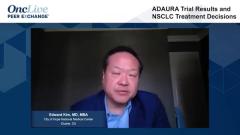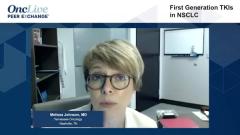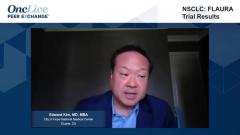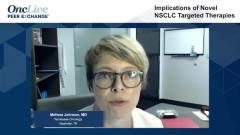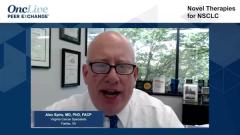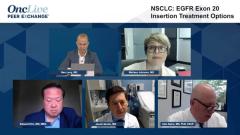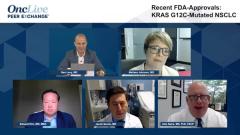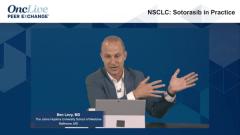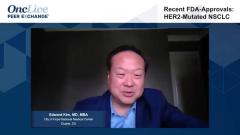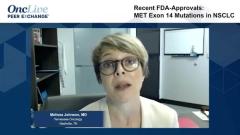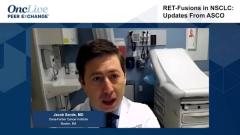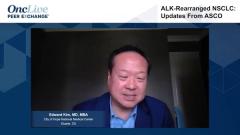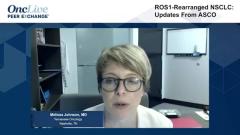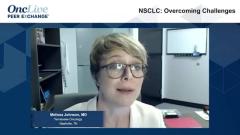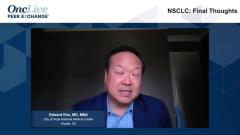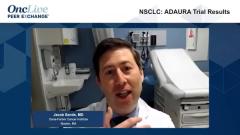
NSCLC: EGFR Exon 20 Insertion Treatment Options
Experts provide an overview of treatment options for exon 20 insertion EGFR mutations in non–small cell lung cancer (NSCLC) and trial updates presented at the American Society of Clinical Oncology 2021 annual meeting .
Episodes in this series

Ben Levy, MD: Let’s move on to the exon 20 story, which is starting to unwind here, even before ASCO [the American Society of Clinical Oncology annual meeting]. EGFR exon 20 [insertion mutation] is harder to drug for a lot of biological reasons. Melissa, do you want to walk us through? Here we go again with amivantamab and mobocertinib. We’ve had some data early on, and maybe some updates at ASCO, where we are with those 2 drugs in the exon 20 space.
Melissa Johnson, MD: Ben, you’re right. In the past we knew only that when you found an exon 20 insertion that they wouldn’t do well with a TKI [tyrosine kinase inhibitor], and they don’t do that well with immunotherapy. You can give chemotherapy to this group of patients. Josh Sabari, [MD,] reported at World Lung [the World Conference on Lung Cancer] the results of the amivantamab single-arm phase 1 and expansion effort for patients with EGFR exon 20 insertions. He reported an objective response rate of 36%, PFS [progression-free survival] of 8 months, and a duration of response of 6.8 months. This is impressive for a group of patients who were treatment silent before this.
Based on that data, we heard about the approval of course 2 weeks before ASCO. At ASCO, Janssen [Pharmaceutical Companies of Johnson & Johnson] reported a real-world data comparison. Because the amivantamab approval was based on a single-arm trial, they used 3 data sets—Flatiron, Kota and ConcertAI—to evaluate a representative group of patients. They took out the duplicated patients and ended up with a cohort of 126 patients who were similar to those patients in the data set at World Lung, and then asked what they got instead of amivantamab. A quarter of them got single-agent chemotherapy because remember this is post-platinum. A quarter of them got checkpoint inhibitors, and a little bit less than a quarter got TKIs. Then they looked at their survival.
The patients who were treated with amivantamab had a median overall survival of 22 months, where patients who were treated in this real-world data set comparison had a median overall survival of 13 months. It was a favorable comparison even though obviously it wasn’t in the same trial. Likewise, PFS was better and duration of response was better in the amivantamab group, suggesting it didn’t matter that it was a single-arm study, this is a drug that’s here to stay.
Now it’s true we have not just 1 drug but a couple more coming down the pike for the treatment of these patients with EGFR exon 20 insertions. One of the other ones is mobocertinib. And at ASCO, Takeda [Pharmaceutical Co Ltd] reported an updated analysis of their EXCLAIM trial in which 114 patients from their dose escalation and expansion trial, and then another post-platinum cohort, were enrolled. They reported a response rate around 28% for those 2 data sets.
It was maybe not quite as high as what we’re seeing with amivantamab, but nonetheless still in the ring of contenders. The big thing that pops out for me with mobocertinib is an adverse event rate of diarrhea in 90% of patients who were treated in the trial; 45% had rash. I should say amivantamab carries with it a risk of rash and infusion reactions.
I might add that there’s a third drug for these EGFR exon 20 insertions. Remember poziotinib? It was the drug that we were talking about maybe even before these other two. They reported at ASCO a CNS [central nervous system] experience, where of 36 patients with CNS metastases, 3 of them had complete responses when treated with POZI [poziotinib]. This is a potent third option. It’s never been more important to look on NGS [next-generation sequencing] reports to find these patients.
Ben Levy, MD: You’ve got to know what type of EGFR exon [mutation] it is to make the right decision. That’s a good point.
TRANSCRIPT EDITED OR CLARITY


